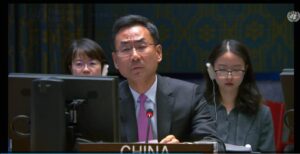In the elections on November 5th some 20 million voters latinos They will be able to decide who will be the winner between donald trump and Kamala HarrisHowever, analysts do not see clearly where the vote of this communitybecause being a Republican or a Democrat is a trend that has changed.
The number of new voters considered Hispanics or Latinos is an unprecedented event in American history. For this reason, a group of analysts listened to surveys and sociodemographic and economic studies during the third panel of the Global Forum Latin America and the Caribbean 2024who carried the topic “America Latina and the US elections: Role of vote Latin; economic and foreign policy implications.
In it event shared their views on the situation that they see as an extraordinary event, regarding the role of the elector Latin refers and what the region can expect if it wins Kamala HarrisDemocratic presidential candidate, or the Republican donald trump.
Jorge Castañeda, former Minister of Foreign Affairs of Mexico, and professor at New York University, participated in the discussion; Eduardo Gamarra, professor in the Department of Politics and International Relations at Florida International University; Tulio Vera, interim president of Global Americans; Mark Hugo López, director of Race and Ethnicity Research at Pew Research Center.
The moderation of event It was led by the former president of the Dominican Republic, and president of the Global Foundation for Democracy and Development (GFDD/Funglode), Leonel Fernández.
A crucial factor
For the professor of the Department of Politics and International Relations at Florida International University, Eduardo Gamarra, the vote Hispanic will be a crucial factor that could define the political future of the United States. The differences in self-perception, values, national origin and electoral participation make it an extremely diverse and complex bloc, whose power and influence are growing, he warned during his participation.
As an example, he pointed out the participation of voters Hispanics As a determining aspect, to underline the opinion he mentioned the Cuban voter, who is “extremely disciplined”, with participation rates that reach 74% in some areas of Miami-Dade, he specified, with the exception that the average participation of the rest of the Hispanics does not reach 50%, which could tip the electoral balance significantly.
Gamarra indicated that the community Hispanic In the United States it is not monolithic, which complicates the analysis of its electoral behavior. He pointed out the case of Puerto Ricans in Florida, whose vote has been a Democrat, but in 2022 46% of them supported Republican Ron DeSantis for governor.
In addition, he highlighted the role of the so-called hinge states, and specifically the case of Michigan, which has a population Hispanic between 4% and 5%, which translates more or less into 250,000 voters.
“If of those 250,000 we assume that in a good election year 60% will vote, then we are saying that they will see between 100,000 and 150,000 Hispanics will vote,” he said to emphasize that the result in Michigan is going to be defined by less than that margin, which at vote Hispanic can be “absolutely defining.”
Gamarra also warned about the changes of opinion of the Hispanic voters, which he considered as “something relevant” that could tip the balance in the so-called hinge states, which also include Pennsylvania, Wisconsin, Georgia, North Carolina, Arizona and Nevada.
Less and less democratic
Former Foreign Minister Jorge Castañeda said he was not sure that all segments of the vote Latin act in the same way, and pointed out that, sometimes, surveys or comments on surveys indicate that the vote Latin this time it will be less democrat than on other occasions.
Castañeda indicated that although this trend applies to the vote Mexican or North American, considers that it is necessary to reflect on whether it is influenced by the arrival of new Latin contingents that have arrived in the United States in the last 20 years. Although he expressed his doubts about the reasons that would lead a Mexican-American to vote for Trump.
“I understand the reasons why other Latin groups can do it, but the case of Mexicans is difficult for me,” he stated in his presentation.
In that sense, the diplomat maintained that a victory for the Republican candidate is “what is least convenient for the vast majority of the countries of America America is for Trump to be the next president of the United States.”
To support his point, the analyst pointed out two facts: “Firstly, because we already experienced it and know more or less what it means, and secondly because a second Trump administration would lack counterweights, limitations, restrictions, that have already been discussed a lot in the United States in these months of the campaign.
For the other point, he added that “there are many reasons to suppose that a victory of the Vice President Harrissince it would mark a good degree of continuity with President Biden’s policies for many reasons, but among others because as vice president Kamala Harris because he has not shown greater interest or commitment to America Latin in one sense or another, and therefore would probably follow more or less the current guidelines.”
There are no differences between the candidates
Castañeda pointed out in his presentation that the fundamental difference between Trump and Harris on some of the most important issues for most of the countries of America Latina, it’s not that big.
The professor gave the immigration issue as an example, indicating that Harris has hardened the tone a lot in these weeks, regarding her position on the issue of Latin American migration, and this hardening of tone goes together with a fundamental hardening of the specific policies of the Biden government, of which she is a part and which she would surely maintain.
![]() Another fact that stands out is that many people have already commented that between Trump’s real policies for four years and Biden’s real policies for four years on immigration matters, they were not that different, even if the rhetoric of racism and xenophobia, among others.
Another fact that stands out is that many people have already commented that between Trump’s real policies for four years and Biden’s real policies for four years on immigration matters, they were not that different, even if the rhetoric of racism and xenophobia, among others.
He also said that both candidates – although Trump puts it more stridently – are anti-Chinese: “both are constantly insisting on all the things, all the retaliations, measures, etc. that they are going to take.” against China in commercial, investment and intellectual property matters. Regardless of whether they are right or not, beyond the rhetoric, the positions are quite similar and this is going to place many countries, not all, many countries of America Latina, of course to Mexico but not only to Mexico, in a very complicated, very uncomfortable situation,” he reflected.
For Castañeda it is evident that, for Mexico, the Central Americans, the Caribbean countries and several nations of the southern cone as well, the Chinese investmentnot in place of American or Japanese or German investment.


